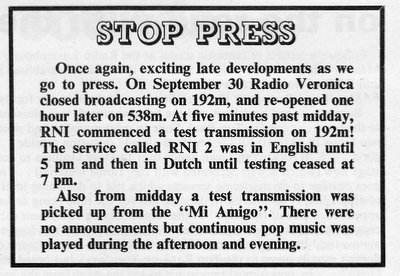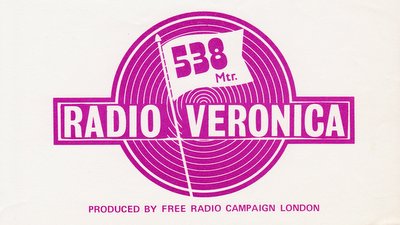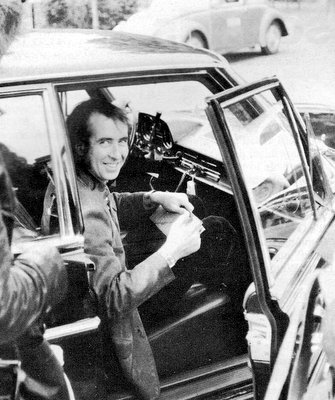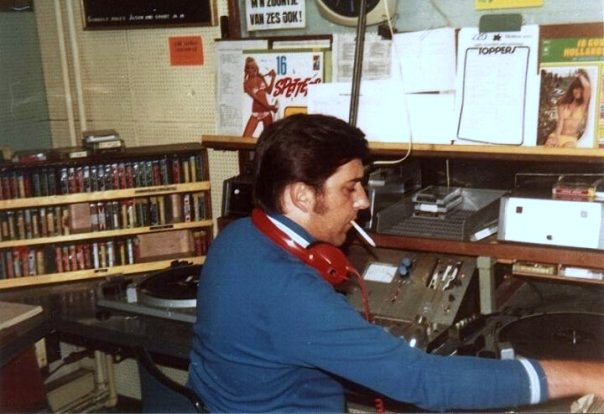On Monday 22nd November 1971 the Mebo II dragged her anchor in a storm and was carried inside territorial waters. Requests for help were put out but transmissions had to cease once the ship
entered the three mile limit. The ship drifted dangerously close to a sandbank but fortunately the tugs Thames and Smitbank arrived in time and the ship was towed back to her anchorage, safe and sound.
 Terry Davis on RNI, as the ship is towed back into position after drifting. Recording from the Offshore Echo's tape
Offshore Classics vol.3, used with kind permission (duration 2 minutes 31 seconds)
Terry Davis on RNI, as the ship is towed back into position after drifting. Recording from the Offshore Echo's tape
Offshore Classics vol.3, used with kind permission (duration 2 minutes 31 seconds)
From Christmas Eve 1971 until 3rd January 1972 the station broadcast non-stop, twenty-four hours a day, carrying RNI into a new year. It was at this time that the short wave ‘World
Service’ was suspended. On 2nd January, in his Northsea Goes DX programme, A.J Beirens announced that it would return in February, not only on short wave but also
on 270 metres, 1115 kHz, medium wave. This, in fact, never happened but some late night tests did go out on 1115 kHz, as well as 773kHz and 845kHz.
In January 1972 the first English language commercials since 1970 were broadcast (for Camel cigarettes) and this strengthened the rumours that a possible separate English-language channel could be launched.
However the months passed with no sign of progress and at the beginning of May the Dutch output was increased by a further hour at the expense of the English programmes. The daytime service was proving very
successful, so much so that in June the shore based company was able to move into new offices and studios in Bussum. That summer a survey showed that the station had 4.5 million listeners. It had taken
£250,000 in revenue in the first two months of the year. It was, at last, a very profitable business. The daily Kent Request Hour, sponsored by Kent Cigarettes, brought in £8,000 a quarter alone.
| RNI PROGRAMME SCHEDULE SUMMER 1972 |
| regular schedule |
evening specialist shows |
6.00am “Morning Edition”
9.00 Alfred Lagarde
11.00 Peter Holland
1.00pm Tony Berk
3.00 Ferry Maat
5.00 “Driemaster”
7.00 Paul May
9.00 Robb Eden
11.00 “Kent Request Hour” (sponsored)
12.00am Brian McKenzie
3.00 closedown
(weekends 3.00-6.00am “Skyline”)
|
TUESDAY NIGHT/WEDNESDAY MORNING:
12.00-2.00am “Rock n'Roll Special”
SATURDAY:
7.00-10.00pm “International Prediction Hit 40”
SUNDAY:
7.00pm “Hitback Show”
9.00-11.00 “Cloud Nine”
|
 Spangles Muldoon on the Kent Request Hour on 14th September 1972. It was Spangles' first day back on the station. This is an edited version of a recording shared by
The Offshore Radio Archive (duration 5 minutes 7 seconds)
Spangles Muldoon on the Kent Request Hour on 14th September 1972. It was Spangles' first day back on the station. This is an edited version of a recording shared by
The Offshore Radio Archive (duration 5 minutes 7 seconds)
In September a third ship joined Veronica and RNI off the Scheveningen coast. The old Caroline South ship, the mv Mi Amigo, had returned to sea and work was under-way for the return of Radio
Caroline. Station owner Ronan O'Rahilly paid a visit to the Mebo II and persuaded engineer Peter Chicago and DJ Spangles Muldoon to join the new project. Spangles, who had only
been back on RNI for a few days, announced his resignation on the air and hinted strongly at where he was going (“adding 39 to RNI's 220 metres”).
|

|
|
‘Dee Jay & Radio Monthly’ reports (not very accurately) on the arrival of RNI 2.
|
30th September 1972 was BBC Radio One's fifth birthday but it was a big day for offshore radio too. Radio Veronica, the hugely popular Dutch station which for twelve years had been
transmitting on 1562 kHz, 192 metres, was due to change frequency because of night-time interference. This change had been widely publicised so it was no surprise to anyone when, at 12.30pm, 192 went dead.
It was a total shock however, especially to Veronica's programme director Rob Out, who was giving a press conference at the time, when only a few seconds later another transmitter sprang into life on this
same wavelength playing Man of Action, RNI's theme. Northsea had at last unveiled its second medium wave transmitter!
Disc jockey Tony Allan (who had returned to the station in February) then announced the station's name - “RNI 2”. At 1pm Veronica was back on the air, as planned, on
557 kHz, 538 metres, and RNI 2, after briefly relaying Veronica's opening, continued with English language programmes. These were also broadcast on the station's 49 metre short wave outlet.
There was noticeable audio breakthrough from the Dutch service whose programmes could be heard clearly in the background. This got worse as the day went on. Tony Allan was followed by Brian
McKenzie, Arnold Layne and Terry Davis. At 7pm, when RNI's usual English-language service started, 192 closed down.
|

|
|
Radio Veronica car sticker, publicising the new wavelength.
|
 Radio Veronica closes down on 192 metres, followed by Tony Allan opening up RNI 2 (duration 5 minutes 16 seconds)
Radio Veronica closes down on 192 metres, followed by Tony Allan opening up RNI 2 (duration 5 minutes 16 seconds)
 Brian McKenzie on RNI 2 (duration 3 minutes 10 seconds)
Brian McKenzie on RNI 2 (duration 3 minutes 10 seconds)
 Arnold Layne on RNI 2, with the breakthrough of the Dutch Service very noticeable in the background (duration 2 minutes 45 seconds)
Arnold Layne on RNI 2, with the breakthrough of the Dutch Service very noticeable in the background (duration 2 minutes 45 seconds)
 Terry Davis closes RNI 2 down at 7pm. These four airchecks have been taken from a full recording of the day's output of RNI 2, available on www.azanorak.com.
Our thanks to Jim Nantz and Ray Robinson (duration 3 minutes 43 seconds)
Terry Davis closes RNI 2 down at 7pm. These four airchecks have been taken from a full recording of the day's output of RNI 2, available on www.azanorak.com.
Our thanks to Jim Nantz and Ray Robinson (duration 3 minutes 43 seconds)
The next day, just over an hour's programming went out on 192 but then the transmitter fell silent. Over the following weeks many of the station's programmes went out on 192 as well as the
usual frequencies but no more special RNI 2 programmes were presented and after a few weeks the 192 service was suspended altogether. Apparently there was intermodulation between the two medium wave transmissions
and spurious signals were being emitted which could have caused interference. However some cynics suggested that RNI never really intended to run a second service and that the short-lived 192 broadcasts may just
have been a publicity stunt.
|

|
|
Brian McKenzie. Photo from FRC Germany, published in ‘Dee Jay & Radio Monthly’.
|
The Pirate Radio Hall of Fame asked Arnold Layne if he could remember the reason behind the abandonment of the second service. He said: “If I remember
correctly, the main reason for RNI 2's appearance for only one day was a technical one, involving difficulties with running two MW frequencies from one mast without the necessary diplexer, or otherwise cross-modulation
between the signal from the main mast and the one from a wire that had been run up for Veronica's old frequency.” However he also commented: “I recall that there was something half-hearted about the RNI
2 thing, a general feeling aboard that it wouldn't come to anything.” Talking about RNI 2, a few months after the event, Mike Ross told Dee Jay & Radio Monthly: “We
found that we had a ‘beat carrier’ which gave us up about 257 metres, which was the two carriers beating together to form a third carrier, taking the modulation with it .... any idea of an all day English
Service was scrubbed as it was a technical impossibility .... You can't put so many transmitters in a boat and expect them to work perfectly .... You must remember that at one stage we were broadcasting on five frequencies.
We gave up the 31 metre band frequency because, as it is a productive frequency you cannot receive any news broadcasts, you cannot watch television and most of all you cannot touch anything without getting a shock.”
|

|
|
Don Allen in the RNI studio. Photo courtesy of Kenny Tosh.
|
On Tuesday 24th October 1972 a crisis hit the International Service of RNI. With no prior warning, the English-language service was dissolved and the disc-jockeys sacked. At 7pm, when the listeners
expected to hear Tony Allan, in his place was Dutch DJ Nico Steenbergen. Dutch programmes then continued until closedown. A dispute between the English DJs and the Dutch management had resulted in John de Mol, boss of
the company, firing them all. Without consulting his partners, Mebo Ltd., he unilaterally decided to replace the International Service with his own programmes. Although the evening output had millions of listeners,
it had very few advertisers and he knew that Dutch programmes would be less trouble and probably make more money. The parent company Mebo Ltd. was not at all happy with this decision. Station founders Erwin Meister and
Edwin Bollier had visions of RNI becoming an important international voice and they were aware that English was more widely understood than Dutch. Mebo over-ruled Mr de Mol and, on 3rd November, the International Service
was reinstated. DJs Brian McKenzie and Mike Ross were brought back and ex-Caroline North DJ Don Allen came in as Senior DJ/Programme Controller. Mr Bollier's secretary, Eva Pfister,
became station manager and DJ Robb Eden moved onto the administration side. Now the evening service was run by Mebo itself, not by the Dutch production company. On 12th November the
Sunday ‘World Service’ was brought back too and on the 20th the evening shows were extended to run 7pm-3am GMT.
 Don Allen on his first day on Radio Northsea International, 3rd November 1972 (duration 3 minutes 7 seconds)
Don Allen on his first day on Radio Northsea International, 3rd November 1972 (duration 3 minutes 7 seconds)
 Brian McKenzie, later the same evening. Both clips are from the station's FM outlet and are taken from a recording made available by The Offshore Radio Archive (duration 3 minutes 32 seconds)
Brian McKenzie, later the same evening. Both clips are from the station's FM outlet and are taken from a recording made available by The Offshore Radio Archive (duration 3 minutes 32 seconds)
| RNI INTERNATIONAL SERVICE PROGRAMME SCHEDULE NOVEMBER 1972 |
| regular schedule |
specialist shows |
5.00am Dutch programmes
7.00pm Mike Ross
9.00 Don Allen
12.00am Brian McKenzie
3.00 closedown
(weekends 3.00-5.00am “Skyline”)
|
FRIDAY:
7.00-9.00pm “International Top 30”
11.00pm-1.00am “Rock n'Roll Special”
SATURDAY:
11.00pm-1.00am “Country and Western Jamboree”
SUNDAY:
7.00-9.00pm “Hitback Show”
and on short wave:
9.00am-7.00pm RNI World Service
(incl. 9.00-10.00am Northsea Goes DX
1.00-2.00pm Feature Hour
6.00-7.00 Jazz)
|
|

